********************
On November 5, 2006, you may have seen a post on this blog titled Coochie Coochie Coo. This was Janet’s post about humoring me and going with me to see Muzaffir Ali’s 1981 motion picture Umrao Jaan, starring Rekha in the lead role, at the Freer Gallery of Art.
A few weeks later, Janet once again humored me by going to see J.P. Dutta’s 2006 version of Umrao Jaan starring two of my favorite Indian actors: Aishwarya Rai as Umrao Jaan and Abhishek Bachchan as Nawab Sultan. After the movie, I asked Janet what she thought and she said, “I liked both for different reasons. But I’ll tell you what, you write up a review of the two movies and I'll post it on my blog.”
As you can see, that was exactly one month ago; I have been telling her on almost a daily basis that I was working on the entry. Truth be told, I have been procrastinating this entry for several reasons. First, I am not a movie critic. Second, I do not have a whole lot of respect for movie critics; I believe that 99% of the time they completely miss the mark. And, third, I think I watch movies from a different perspective than most people. Perhaps I will be proven wrong today.
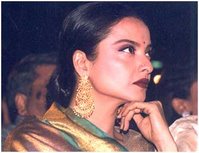 I believe that the best actors/actresses are the ones who identify strongly with the characters they choose to play. I believe that a part of who the actor/actress is in their private life comes through in the parts they play. There is no exception in my mind with the two actresses that have played the part of Umrao Jaan. Do not misinterpret my meaning, though: I would never say that Rehka (Umrao Jaan, 1981; photo above) or Aishwarya Rai (Umrao Jaan, 2006) are courtesans, because they are not. But they both understand the constant search for happiness and recognition Umrao Jaan went through.
I believe that the best actors/actresses are the ones who identify strongly with the characters they choose to play. I believe that a part of who the actor/actress is in their private life comes through in the parts they play. There is no exception in my mind with the two actresses that have played the part of Umrao Jaan. Do not misinterpret my meaning, though: I would never say that Rehka (Umrao Jaan, 1981; photo above) or Aishwarya Rai (Umrao Jaan, 2006) are courtesans, because they are not. But they both understand the constant search for happiness and recognition Umrao Jaan went through.In an article in Rediff, journalist Suhash K. Jha quoted the following about an interview that he was granted with Rehka in September 2001:
“I don’t think anyone knows the real Rekha. Not even Rekha herself. There’s this constant exploration of the ‘real Rekha’ that goes on between the actress and her hand-chosen journalist friends. Too bad I’m not one of them.
“The one interview that I did with her was, according to her, a failure. ‘He didn’t understand me,’ she told a mutual friend later.’
“Now I realize what she meant. To Rekha, her mask is both a protecting shield and a tragic face of stardom. She wants it on, but she also wants it peeled off, so she would feel like herself again.”
This is exactly what Rekha captured in her portrayal of Umrao Jaan as Muzaffir Ali interpreted the story. Umrao started out as the kidnapped child Ameeran sold to a Kotha(1) by her kidnappers. Being too young to understand the full impact of what has happened to her, Ameeran becomes accustomed to her surroundings and the luxury that is placed in her grasp and faithfully works toward the goal of being a successful courtesan. She never completely forgets Ameeran while being trained to be Umrao Jaan, the courtesan of Lucknow. Umrao gained the title Jaan as soon as she lost her virginity to her first paying customer. Umrao Jaan was a mask placed on Ameeran.
Throughout her life as a courtesan, all Umrao Jaan wanted was to be loved and cared for by one man. She held onto the dreams of the girl Ameeran, while facing her world as Umrao Jaan. In my mind, only a person who understands what it means to wear a mask that hides the real self could portray the same type of character on screen. Rekha learned early in her career to put on a mask to protect her real self from the harsh realities of life in the movie industry.
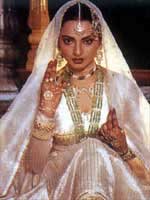 I loved Rekha’s portrayal of Umrao Jaan; it was raw and full of emotion. She captures the essence of lost innocence—a lose caused by the selfish choices of others. All you have to do is watch the last song sequence in this movie to see how powerful her performance is. As she dances and sings the song Yeh Kya Jagah Hain, (loosely translated “what is this place, friends?”), she is questioning her existence both as Ameeran and Umrao Jaan, but more importantly as a woman in 19th Century India. To see the strength and beauty of Rekha’s performance, you must watch the film. You can find the movie on Netflix.
I loved Rekha’s portrayal of Umrao Jaan; it was raw and full of emotion. She captures the essence of lost innocence—a lose caused by the selfish choices of others. All you have to do is watch the last song sequence in this movie to see how powerful her performance is. As she dances and sings the song Yeh Kya Jagah Hain, (loosely translated “what is this place, friends?”), she is questioning her existence both as Ameeran and Umrao Jaan, but more importantly as a woman in 19th Century India. To see the strength and beauty of Rekha’s performance, you must watch the film. You can find the movie on Netflix.I don’t know if I have adequately described Rekha’s performance, but I enjoyed the experience so much that I purchased a copy of the movie on DVD as soon as I could. Janet can tell you that there are very few movies in my collection that I do not like, but even fewer that I list under the category of “must watch.” This one makes it into that category.
Happiness plays hide-n-seek with me.
I don’t know who’s hiding, and who’s seeking,
But we’re old friends…
—Aishwarya Rai about herself (August 2002)
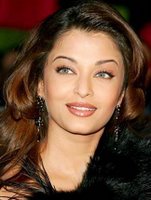 If anyone could play the part of a woman searching for happiness it is Aishwarya Rai (photo at left.) She fits into the J.P. Dutta interpretation of Umrao Jaan, because she lives two lives: her public life and her private life.
If anyone could play the part of a woman searching for happiness it is Aishwarya Rai (photo at left.) She fits into the J.P. Dutta interpretation of Umrao Jaan, because she lives two lives: her public life and her private life.From the very beginning, Mr. Dutta has spoken of his interpretation in terms of how Ameeran lives her life. Dutta’s movie is seen from the perspective of Ameeran remembering her family and life in Faizabad prior to her kidnapping. Even remembering her life, Ameeran is just a child who does not understand that she could have obtained her freedom from the life of a prostitute by running away from the Kotha. Instead she says, “I was born unlucky. The buffetings of fate and chance left me stranded in a wilderness. There was no way out except the path of evil.”(2) Umrao Jaan was a public figure and Ameeran was a private figure; throughout all of it, Umrao Jaan longed for the life that Ameeran would have had had she not been kidnapped.
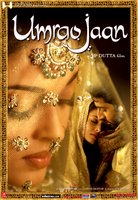 In this version of Umrao Jaan, the public figure Umrao falls in love through the heart of the private figure Ameeran. She gives her whole heart to the man she loves, with a pure hope that she will find lifelong happiness. Umrao actually knew from the beginning that her love was doomed. She once told Nawab Sultan: “after everything, you will remain a Nawab. And me, even after being faithful…will always remain a courtesan.”(3) Unfortunately, Ameeran learns that love will betray the most loyal hearts. She finds herself left alone and broken hearted because her soul mate listened to the lies of another concerning the public figure Umrao. Her soul mate ignored the knowledge he had of the private Ameeran, that she was faithful and loyal. Although he professed his love for her, deep down Nawab Sultan had allowed the name Umrao Jaan to overshadow the beauty and grace of Ameeran, who loved him with her whole heart.
In this version of Umrao Jaan, the public figure Umrao falls in love through the heart of the private figure Ameeran. She gives her whole heart to the man she loves, with a pure hope that she will find lifelong happiness. Umrao actually knew from the beginning that her love was doomed. She once told Nawab Sultan: “after everything, you will remain a Nawab. And me, even after being faithful…will always remain a courtesan.”(3) Unfortunately, Ameeran learns that love will betray the most loyal hearts. She finds herself left alone and broken hearted because her soul mate listened to the lies of another concerning the public figure Umrao. Her soul mate ignored the knowledge he had of the private Ameeran, that she was faithful and loyal. Although he professed his love for her, deep down Nawab Sultan had allowed the name Umrao Jaan to overshadow the beauty and grace of Ameeran, who loved him with her whole heart.This version of Umrao Jaan was quite powerful. Aishwarya Rai gave a performance full of rich layers of emotion, which are not necessarily seen with one viewing of the movie. Once again, as soon as the movie was available on DVD I purchased a copy. It currently resides on the shelf next to the 1981 version of the movie within the category “must see.”
If you decide to watch these movies, I would make one suggestion: Do not compare them to each other as they are two different interpretations. And above all, do not compare the performances of the actresses; it would be an insult to their individual talents and performance styles.
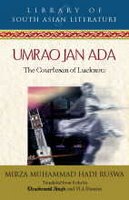 I understand better now why Mirza Muhammad Hadi took the pen name Ruswa, and gave Umrao the poetess the pen name Ada. Perhaps Mirza Muhammad Hadi, as a man, recognized that it was a disgrace (Ruswa) to sell a woman into the flesh trade for she is after all someone’s daughter. But even he recognized that Umrao Jaan endeavored to live her life with grace, poise, and dignity (Ada) after having her heart completely broken by the men who came into and left her life.
I understand better now why Mirza Muhammad Hadi took the pen name Ruswa, and gave Umrao the poetess the pen name Ada. Perhaps Mirza Muhammad Hadi, as a man, recognized that it was a disgrace (Ruswa) to sell a woman into the flesh trade for she is after all someone’s daughter. But even he recognized that Umrao Jaan endeavored to live her life with grace, poise, and dignity (Ada) after having her heart completely broken by the men who came into and left her life.I enjoyed both films for this reason alone: Rekha and Aishwarya Rai are both women who live their lives with grace, poise, and dignity—and infuse the characters that they play on screen with the same qualities. They have both shown women the world over that girls and women have the power to choose freedom over oppression at the hands of others.
1. A Kotha was a ‘high class’ brothel in 19th century Lucknow, India. The Kotha’s of this time were known for courtesans who were highly educated and quite talented in the art form of the Ghazal a form of Urdu poetry. The royal families sent their sons to the Kotha’s as part of their formal education.
2. Ruswa, Mirza Muhammad Hadi, The Courtesan of Lucknow: Umrao Jan Ada. Translated by Khushwant Singh, Orient Paperbacks, 2007.
3. Umrao Jaan, J.P. Dutta, Director. Distributed by Adlabs Films Limited, 2006.



6 comments:
Janeen,
You are a master! Thank you. Would love to see you again. I only have pictures of when you were...how old Janet? So cute!
Now I'm bummed we didn't catch the 2006 version of Umrao Jaan when it played at the local art theater!
There was a review on the theater's website and the story looked intriguing. But I think it only played one week or one weekend.
Two more to add to our Netflix queue! Thanks for the rundown on both films.
Kim: Let's see... Janeen would have been 15 or 16 when you were here.
ME: If the art house shows a movie called Kabul Express or Dhoom2: Back in Action, go see them. Keep in mind, when you see Bollywood films, they're about 2.5 to 3 hours in length, but well worth it. Dhoom2 is like Mission Impossible meets MTV. It's actually really, really good!
I know this is superficial, but I would likely KILL to look like either of these women, if only for a day. Wow.
SML: If you think they're beautiful in the pictures, you should see them on the screen. I'm trying to think of another actress that rivals their beauty and I'm coming up short. I'd have to say maybe Audrey Hepburn. Actually, I think Ashley Judd is quite lovely, as well as Charlize Thereon. Still, I think Rekha and Ms. Rai beat them all out.
Yeah, obviously. Stunning.
I equally like the woman in Crouching Tiger Hidden Dragon for beauty.
Post a Comment